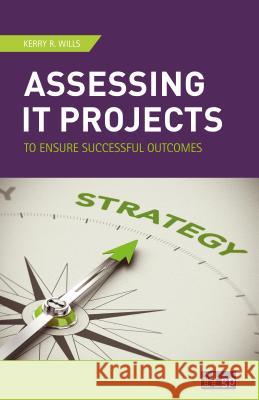Assessing It Projects to Ensure Successful Outcomes » książka
Assessing It Projects to Ensure Successful Outcomes
ISBN-13: 9781849287364 / Angielski / Miękka / 2015 / 1 str.
A comprehensive reference guide to IT project assessments, from planning to presentation Companies invest billions in technology projects each year, yet their success rates remain surprisingly low. Industry benchmarks suggest that only 15-20% of projects are completed on time and on budget. Project failures can impair an organization's capability as well as having significant commercial, compliance, and security ramifications, which in turn could cause reputational damage and long-term financial losses. It is therefore critical that projects meet their objectives. One way of ensuring that they do is to conduct assessments or audits at key points during their lifecycle. Product overview Assessing IT Projects to Ensure Successful Outcomes is a comprehensive reference guide that focuses on the assessment of IT projects. Organised into five main sections (Approach, Plan, Collect Information, Assess and Recommend, Package and Present), interspersed with case studies based on the author's extensive experience delivering projects, the book provides exhaustive guidance on structuring and conducting an IT project assessment, from planning to presentation. Assessing IT Projects to Ensure Successful Outcomes includes guidance on: Types of assessments and project approaches, including the difference between a project and program assessment. Determining a suitable assessment approach, developing a plan, preparing inventories, and planning for logistics. Information collection and assessment, including identifying and addressing challenges and gaps. Project scoping, change management, schedule management, and cost management. Key roles and focus areas, including team responsibilities and necessary documents, for each project stage. Communication strategies to ensure all stakeholders are kept appropriately informed of a project's progress. RAID (risks, actions, issues, decisions) management to address risks and issues that arise, actions that must be performed, and decisions that need to be made throughout the project's lifecycle. Compliance with standard frameworks. Intangibles, such as adapting to company cultures and reacting to cultural conflicts, resource and team dynamics, perception and reputations, and morale. How to package and present an assessment's findings and recommendations in a suitable manner. It also features a detailed summary section containing checklists for assessing all stages of projects - including typical roles on a project team, details of interview responsibilities by role, and a list of necessary project documents. This information can be used either reactively as an easy reference to assess projects, or proactively as a checklist of the considerations and activities required to plan and manage a project. Although principally aimed at professionals who are assessing projects - such as internal auditors, framework auditors, project assessors, or external consultants - Assessing IT Projects to Ensure Successful Outcomes can also be used by project managers looking for a comprehensive view of approaches for managing projects, or as a means of preparing for an assessment of their project. About the author Kerry Wills is a consultant and a project manager who has worked on multi-million dollar technology projects for Fortune 500 companies since 1995, gaining essential experience as program manager, project manager, architect, developer, business analyst, and tester. This breadth of experience gives him a deep understanding of all facets of IT projects. He has planned and executed several large programs, as well as assessed and remediated several troubled programs . Kerry Wills is also the author of Essential Project Management Skills and Applying Guiding Principles of Effective Program Delivery.











